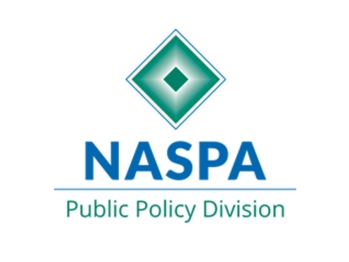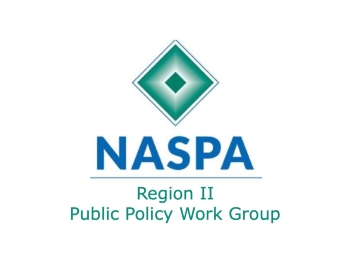
Public Policy Division
Civic Engagement Public Policy Division
NASPA's Public Policy Division was established to support the association' strategic goals and objectives to provide leadership in higher education through policy development and advocacy for students on important national issues. Major responsibilities include formulating a policy agenda for the association, developing responses to policy proposals, and helping to provide members with information concerning relevant legal, legislative, and other public policy topics.
Events
One of the best resources available to you is the wide range of professional development opportunities. This list contains both our “Hosted Events,” workshops and webinars that we plan and manage, and some “Related Events,” hosted by the NASPA Central Office or other NASPA Constituent Groups. To see a full listing of NASPA events, please see the Events page.
Division Leader Roster
Public Policy Division Blogposts
Complete Your Profile
Login and update your profile.
Resources
DATA RESOURCES
IPEDS is a system of surveys conducted annually by the NCES. The surveys collect data on enrollments, completions, graduation rates, faculty and staff, finances, institutional prices, and student financial aid, and all institutions that participate in federal student aid programs are required to report data. The IPEDS Data Center allows users to compare institutional data, create reports, download data files, and access the IPEDS Trend Generator and IPEDS Table Library.
Knocking at the College Door, Western Interstate Commission for Higher Education (WICHE)
WICHE’s signature report, Knocking at the College Door, forecasts high school graduation through the class of 2028 by state and race/ethnicity. The full report, state profiles, and custom data tables are available for download.
Center for Collegiate Mental Health (CCMH), Division of Student Affairs, Penn State University
The CCMH is a research center comprised of over 140 college counseling centers and partners and focused on providing accurate and current information about the mental health of today’s college students. The CCMH is member-driven and serves the interests of mental health providers, administrators, and researchers. In addition to publishing survey instruments and annual reports, the CCMH shares data on case-by-case basis with researchers and practitioners.
FUNDING RESOURCES
NASPA Foundation
The NASPA Foundation supports the discovery of new knowledge through research and innovation in the field of student affairs. This is achieved through a continued commitment to funding selected proposals as submitted annual to the Foundation.
Bill & Melinda Gates Foundation
The goal of the Gates Foundation Postsecondary Success program is to ensure that all low-income young adults have affordable access to quality postsecondary education that is tailored to their individual needs and educational goals and leads to timely completion of a degree or certificate with labor-market value. The Foundation’s priorities include: college readiness; personalized learning; performance measures; and research and advocacy.
The Ford Foundation’s higher education initiative seeks to foster policy and institutional reforms that improve disadvantaged people’s access to and success in high-quality higher education. In the United States, their work focuses on establishing stronger links between two- and four-year colleges; creating robust tuition and financial aid policies geared to the needs of marginalized and low-income students; and scaling up effective academic support programs. The Foundation approaches this work primarily through leadership development; capactiy building and technical assistance; research and public policy analysis; and advocacy, litigation, and reform.
The mission of the Lumina Foundation is to increase the proportion of Americans who have high-quality, college-level learning. The Foundation’s mission is defined by a specific goal: to increase the proportion of Americans with high-quality college degrees, certificates, and credentials to 60 percent by 2025. Lumina Foundation grants focus on two imperatives: Mobilizing to Reach Goal 2025 and Designing & Building a 21st Century Higher Education System.
The Kresge Foundation Education Program aims to increase the number of college graduates in the United States that can fuel a new, education-led era of prosperity and help low-income and underserved people change the trajectory of their lives. Specifically, the Education Program focuses on expanding student access to higher education and promoting academic success particularly for historically disadvantaged students: low income, first-generation, African American, Latino, Asian American and Pacific Islander, and Native American. The Foundation supports activities that: focus on geographic priority; involve networks, systems and groups of institutions; and improve productivity and innovation.
POLICY RESEARCH RESOURCES
NASPA Research and Policy Institute
ACE Center for Policy Analysis
AEI Center for Higher Education Reform
Institute for Higher Education Policy

